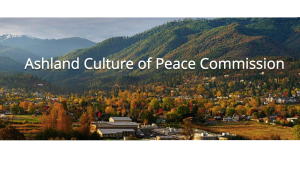. .DEMOCRATIC PARTICIPATION. .
An article by David Wick in the Ashland Daily Tidings (reprinted according to Creative Commons)
-
“My experience and research have convinced me that the world is on the verge of the greatest change in human history: The transition from the culture of war that we have had for tens of thousands of years to a new culture,” and that new development, states UNESCO Director David Adams, “is a culture of peace.”
A 1999 United Nation’s Culture of Peace resolution called for a transformation from a culture of war and violence to one of peace. Aligned with this and Margaret Mead’s notion that it’s only been small groups of thoughtful committed citizens that have changed the world, a group of eight inspired local thinkers collaborated for two years before creating a Culture of Peace Proclamation with the Ashland City Council in March 2015.

Click on photo to enlarge
The city’s proclamation, unanimously adopted by the council, says “(we) strongly encourage residents to work toward development of a Culture of Peace community, and pledge to lend appropriate encouragement and support to that effort.”
Soon an independent, community and citizen-based Ashland Culture of Peace Commission was created. Commission members were chosen to represent many aspects of Ashland’s culture: education, business, the arts, science, environment, religion, law and habitat. An active community support team was also formed. On Sept. 21, 2015, the UN International Day of Peace, the Ashland Culture of Peace Commission was launched in a community-wide celebration.
The commission and the community support team’s first actions have been to define the Ashland Culture of Peace as a community-wide movement dedicated to transforming our attitudes, behaviors, and institutions into ones that foster harmonious relationships with each other and the natural world.
Initial focus areas being developed are:
1. The Peace Ambassador Program — Training volunteers to be a positive presence in our community and on our streets, engaging in person-to-person dialogues and arranging peace forums on topics important to our community.
2. Peace Education — Offering exciting, skill-based and peace-focused learning experiences to schools in the Ashland School District.
(Article continued in right column)
How can culture of peace be developed at the municipal level?
(Article continued from left column)
3. Community Resource Directory — Identifying, listing, and dialoguing with organizations and people in our community who are already contributing or want to contribute to a culture of peace for Ashland.
4. World Peace Flame Monument — Establishing the venue and financial support for Ashland to be the 12th site in the world for the World Peace Flame, a symbol of peace, unity, freedom and celebration that will draw visitors from around the world.
5. State of the Culture of Peace in Ashland Report — Writing an annual report that will be presented to the community and City Council to provide a view into how we are doing in co-creating a Culture of Peace in Ashland.
Cities are the real societal structural level where a Culture of Peace can take root. The individual person is always the essential component for building peace through his or her daily choices, but it is the city that has the reach, authority, responsibility and influence to set the positive tone and direction for so many. When the City Council and Mayor adopted the Culture of Peace Proclamation, they strongly encouraged residents “to work toward development of a Culture of Peace community” and pledged “to lend appropriate encouragement and support to that effort.”
With our unique approach, Ashland has the opportunity to become a model of this new culture for cities around the world. It is about shifting mindset and behavior in all aspects of our societies to embrace humanity’s interconnectedness as we move from force to reason, from discord and violence to dialogue and peace-building. For sustained change there must be a larger context, a vision that inspires and unifies citizens to move forward. This vision has launched the Ashland Culture of Peace.
This is the first of a regular series of articles by the ACPC on various aspects of creating a culture of peace, both here and elsewhere. Next time we’ll address the question, “What is a Culture of Peace?”
Current commissioners include: Amy Blossom, Ben Morgen, Bert Etling, Bill Kauth, Catherine McKiblin, David Wick, Eric Sirotkin, Greeley Wells, Jack Gibbs, Jeff Golden, Joanne Lescher, Joe Charter, Norma Burton, Pam Marsh, Patricia Sempowich, Richard Schaeff, Tighe O’Meara and Will Sears. The original developers included some of the current commissioners, plus Elinor Berman, Irene Kai and Kathleen Gamer.
Contact David Wick via email at ashlandcpc@gmail.com, or drop by the ACPC office at 33 First St., Suite 1, Ashland. The commission’s website is at www.ashlandcpc.org.